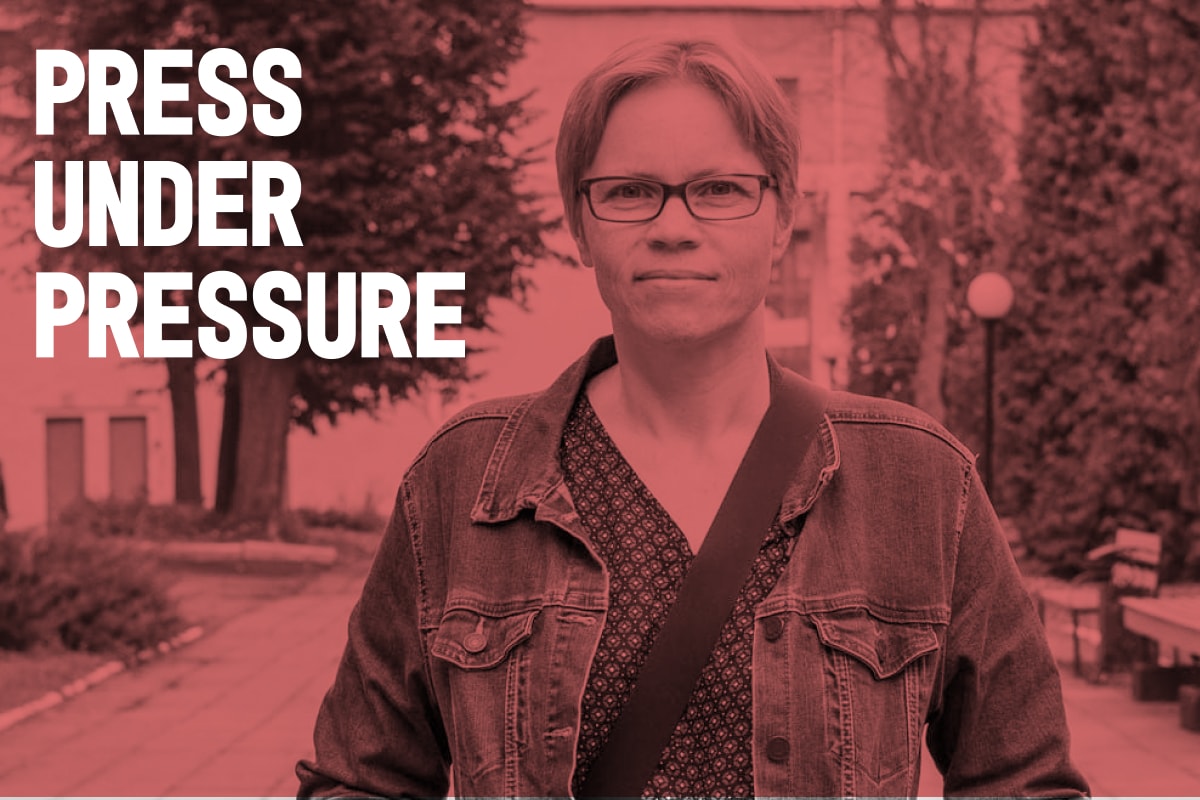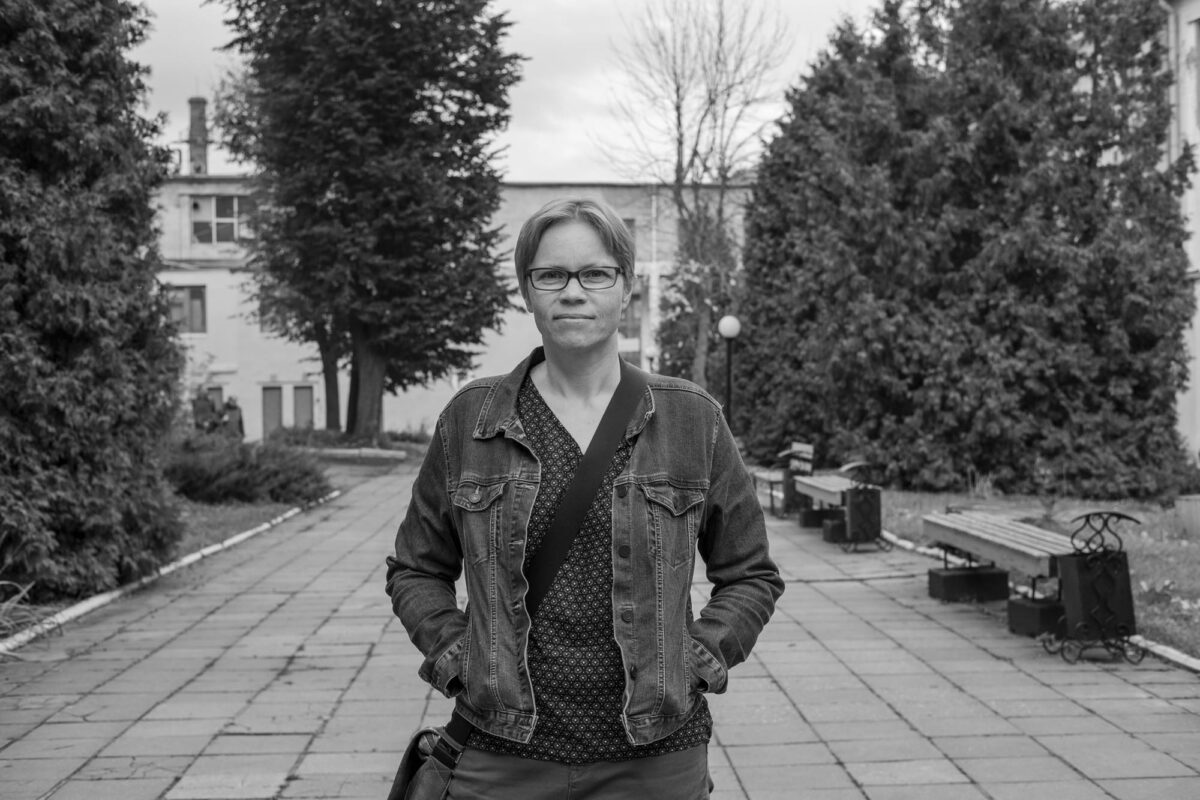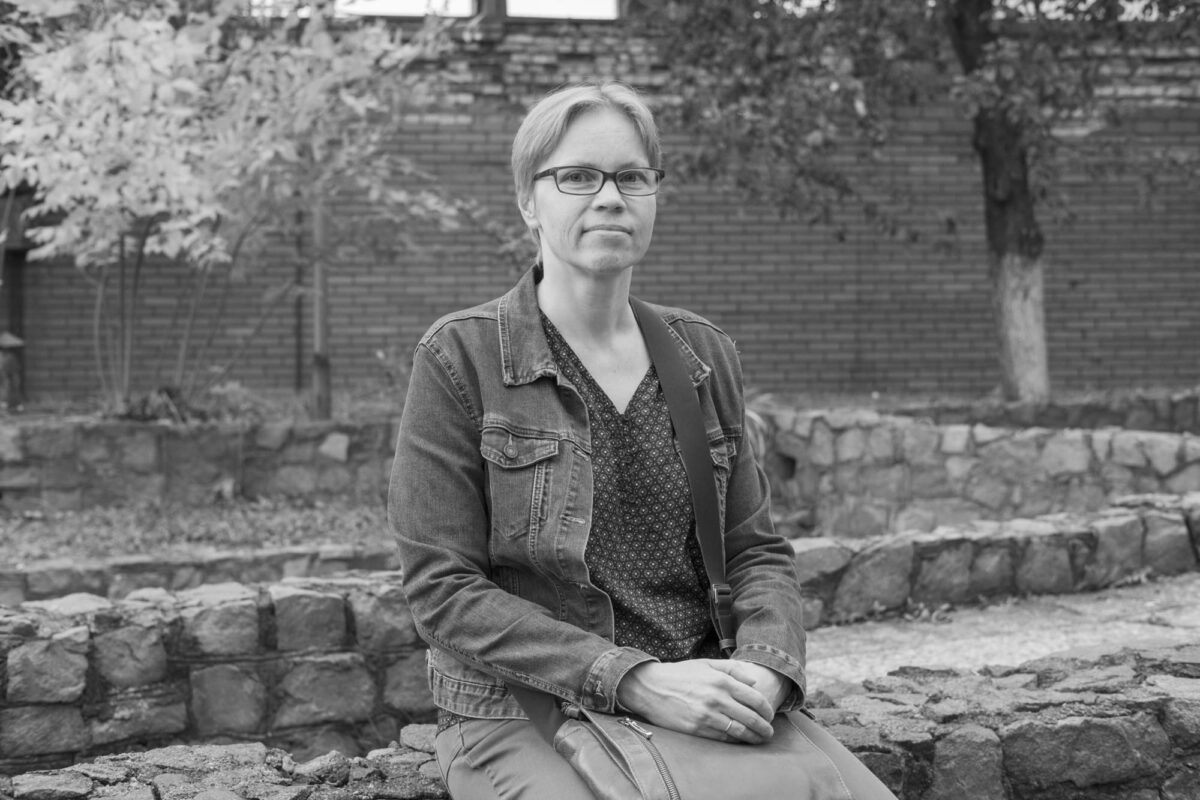
We talked with Maryna Zolatava in October 2020, during which time the largest information portal in Belarus had numerous obstacles put in its way by the authorities. TUT.BY journalists have been detained and arrested more than once.
From August to September 2020, the Ministry of Information issued four warnings to TUT.BY for articles they had published. And from October 1, by order of the Minister of Information Igor Lutsky, the portal lost its accreditation as a media outlet for three months.
The economic court’s decision of December 3, 2020, stripped TUT.BY of its media status. This, however, didn’t stop the repressions. The day 18 May 2021 was the black day in the history of the media. The authorities attacked TUT.BY: searches, employees, and partners detained, equipment confiscated, accounts blocked and the Internet resource blocked completely.
15 portal representatives (including its Director General and editor-in-chief) were at pre-trial detention facilities or under house arrest. They were accused of tax crimes. There’s still no court judgement on this case. To some of the detained the measure of restraint has been changed.
Maryna Zolatava as well as the CEO Liudmila Chekina remain at SIZO-1 [pre-trial detention center]. On October 20, 2022, the KGB of Belarus (the Committee for State Security) put both on the list of persons involved in terrorist activity.
The list also included two former TUT.BY journalists who have been in custody since 18 May 2021 and were later released in 2022 (they remain involved in the criminal case) — Volha Loika and Alena Talkachova.
On 17 March 2023, Judge Valiantsina Ziankevich announced the sentence for Maryna Zolatava and Liudmila Chekina: 12 years in a penal colony. The trial was held behind closed doors.
Of course, we realized that the elections were going to be anything but «normal». That is, we probably realized it the moment the election date was announced, and immediately, Tikhanovsky, Tsepkalo, and Viktor Babariko proclaimed their candidacies. It became clear everything would be completely different this time.
What measures are being taken by the government to manipulate TUT.BY? First of all, of course, a lawsuit, which is currently being considered in the Economic Court of Minsk and seeks to revoke the media status of TUT.BY. As of now, the most popular Internet resource in Belarus has its status suspended.
What does it mean? It means that our journalists are not considered to be representatives of the media at protest actions, which gives the security forces a reason to treat them as participants instead. Hence they may be detained, delivered to police departments, and become defendants in judicial processes, and so on.
However, let’s admit that the media status and a red press card or blue vests or any documents whatsoever never offer a hundred percent protection to representatives of the independent media.
We witnessed over 40 journalists across the country detained in just one day while covering protests. Administrative protocols were drawn up against them for alleged resistance to police officers.
Media status is a protection for a journalist in a situation where the law prevails. However, it currently makes no difference whether you have such status or not. We still hope we manage to defend our rights, and in this respect, we are delighted and empowered by the support from colleagues, professional solidarity, and support from our audience that knows no limits.
This game with the status is such a common story: it affects both TUT.BY and foreign correspondents. The steps were taken simply to restrict the admission of journalists to the scene.
The authorities try different methods. For example, they can restrict access to an internet resource, which we have observed several times since August, when a number of popular platforms were actually blocked, and users could only access them through a mirror or VPN.
Another form of confrontation includes restricting journalists access to events through revoking either their accreditation or their media status. But this is a fool’s errand, because you can restrict ten, twenty, thirty and even a hundred journalists from covering the protest; you can even restrict all of them; but what will you do with the dozens, hundreds of photos and videos that are being distributed through social media channels, or recorded and forwarded to journalists?
Consequently, this kind of confrontation with independent media appears to be ineffective, because the spread of information can’t be limited in 2020: people will never stop recording and sending videos to each other.
The third way of confronting independent media is to detain journalists and either sentence them to a fine or keep them for identification in a police department for three hours, and sometimes more, start an administrative process and arrest them for one, three, eleven days, or however much.

Maryna Zolatava
I have no answer to the question of why we have not been blocked. I can only guess. It should be understood that in those few days when Belarus had problems with the internet, we had problems as well, because the TUT.BY access link was physically limited fourfold. That is, only one in four users could visit the website.
So this is what we see: first they detain our journalists several times, then they suspend our media status, then they will revoke it, and then, if the previous steps fail, they can use other methods of confrontation.
I can assume that blocking access to TUT.BY will spark a massive public outcry, which will manifest itself through something more than just a nervous reaction of the international community, which is not new to us. For example, a couple of weeks ago, during a protest action, a column of people were passing by the TUT.BY office shouting, «TUT.BY!», «TUT.BY – well done!» It was pretty loud, by the way.
When you see people participating in protests with banners «Hands off TUT.BY», when you hear countless words of support, then you understand that, probably, this may also be a reason why the authorities might not yet be ready to resort to this particular measure…
Since mid-September, I had been keeping a record of how many times our journalists got detained since the beginning of the election campaign: that is, from the beginning of May 2020. 12 journalists were detained 19 times. Among them, Lyosha Sudnikov alone was detained four times. When he was detained on September 1, not just to establish his identity, but to become a defendant in a judicial process, Lyosha and colleagues from other media organizations, six people in total, were sentenced to three days of administrative arrest for alleged participation in an unauthorized protest. This was his fourth time. After that, I lost count, to be honest.
Our regional journalists suffer the most, because everyone knows them well in their towns. They are often detained just as soon as an action starts, or even before its start, taken to a police department to sit there for, say, three hours, and then released. This is total lawlessness.
This is outrageous, so outrageous that when our guys were detained on September 1, and were not released the next day, we just went to the Ministry of Internal Affairs building with posters, hoping that the Minister would come out and talk to us about our journalists, because it all looked like a war against journalists of independent media had been declared by the Ministry. We witness a completely different attitude towards the staff of the state media, when they appear at protest rallies without badges and/or vests, and nothing happens to them. We are in a very different position.
Not only is the behavior of the police outrageous, but also the cynical trials of journalists, when the judge makes a decision based on the testimony of anonymous masked witnesses; or when video materials are not taken into account [as evidence of innocence]; or when the judge allows the transcripts of an administrative case to be ‘amended’. I have no words to describe this in terms of the law. We can only state that the law does not work anymore.
When six journalists were detained on September 1, we were all shocked. That was the moment when we realized the legal default position and that unfortunately it was impossible to intervene with any legal means, because both judges and the police would continue to do what they are doing, with no one saying or doing anything to oppose them.
The Ministry of Information declares in words that we need to sort out the situation, we need a dialogue… A round table was even held after the elections dedicated to the detention of journalists at rallies, with the participation of the Minister of Information and a representative of the Ministry of Internal Affairs. What do we actually see at the end of the day? The Ministry of Information merely issues warnings, submits claims, decides to block access to platforms, and when, for example, 15 people were taken to the police department on Sunday, and sat there for many, many hours, the Ministry of Information did nothing. This is a completely outrageous, cynical, unlawful situation.

Maryna Zolatava
The mood in our editorial office can be best described as a «fighting» one. I don’t mean that we are aggressive; we are instead full of spirit, plan to work a lot and to not lose heart. You see, if we get upset and capitulate in these circumstances, the authorities will get exactly what they want.
When we decided to work in the field of journalism in Belarus, we understood in general terms the environment we were to work in. This job has never been easy. It has been associated with risks and obstacles made by the state for many years. Of course, this problem took on a completely different scale in 2020, but we went into this profession precisely because we are who we are: we do not give up just like that. If we got upset, cried and lost interest in the profession immediately, we would have quitted much earlier.
Of course, I cannot speak for every person in the editorial office. Like many editorial offices now in Belarus, we work remotely and usually only see each other in the city working at protest actions, for example, or near the police departments waiting for our colleagues to emerge. However, at the planning meetings that we attend remotely, I can hear that people are cheerful, that they are in a good mood, in a fighting spirit. No one has ever said they don’t want to keep working in such conditions.
Nevertheless, after two months of work without days off, people get tired and need some rest. That is, we need to find a way to give them some respite, because they have to work on weekends and in the evenings.
I understand that I cannot protect my people, and this is probably what worries me the most, because on Sundays or on the days when the guys leave to cover the protests, you can only calm down when you know that everyone is back home. Well, it’s a very difficult ordeal, when you don’t know whether a person will return home after a protest action or you will have to go to the police department or call somewhere… This feels so wrong and so bad. I wish I never felt like this. I wish we were all sure that a person who left for work, like any other citizen in any other country, would arrive at work and return home safely. Unfortunately, we don’t have any guarantees, regardless of whether we have the media status or not.
TUT.BY stands out from the crowd a little bit, because it is the leader of the BY segment of the Internet, it is the most popular source of information in Belarus. And also because a lot of readers trust us and besides reading us on all the platforms where we are represented, they also write to us and give us valuable information non-stop.
I remember once after the elections when an high-ranking police official told me that even though he didn’t like TUT.BY, he had to read it, because people trust TUT.BY and don’t trust the authorities.
We are often asked, why TUT.BY has become so popular, why we have such a large reach. It seems to me that there is a mixture of factors here, and one of the main reasons is that our founder, Yuri Anatolyevich Zisser, was a great enthusiast and formed a team of similar enthusiasts. Yuri Anatolyevich was not going to do media – he actually wanted to make a Belarusian version of Yahoo, but news turned out to be the most wanted product among all the services that TUT.BY offered to the audience. He used to say such a wonderful phrase: «Do what the people need, and your business will be successful.»
This is truly the main reason why TUT.BY became a success. We have been doing what people really need, what the audience demands. People needed information from varied sources, and we collected that information. Later, we started to grow as an editorial office.
The second reason is that we managed to gather enthusiastic people who got fired up with the idea of doing what people needed, who shared the values that Yuri Anatolyevich Zisser held dear. They even set them down in our internal Code of Conduct – e.g. freedom, honesty, the right to make mistakes — which gave us the opportunity to experiment and develop.
The third reason is that the authorities used to ignore the internet for quite a long time, without giving it all the «precious» attention they would give to the print media, television, and radio. So while traditional media were under state control, the internet was able to evolve, which gave us several years grace period.
On the other hand, the media market in Belarus is underdeveloped. The situation we find ourselves in, when one internet media organization has a reach of more than 60%, is quite unique. Maybe it is the case somewhere else in the world, but I have not heard of it. I guess the reason is to be found both in the fact that we have a very cool team and in the fact that very few people risk investing in the media business in Belarus. It means we do not have a media market as such. There are several key players, there is someone smaller, but in general there is nothing like the competition you see in Russia, Ukraine, Lithuania, Poland, of course.
The story with the COVID-19 was a watershed moment when people demonstrated they could be thought of as ‘civil society’. That each person is valuable. Each person is able to make a difference, do something important. The work that our users, our audience are currently doing is the manifestation of the maturity of civil society.
User-generated content is related to the media, and to crowdfunding, and joint work on various projects. This is something that has been working really well in the Belarusian society since the onset of the COVID-19 pandemic. People realise they can mobilize to do something together to solve a problem.
When we see that there are hundreds of events going on in the country, and we have no resources to cover all of them on our own, we ask the audience to help us — send a photo, a video — and people do it with enthusiasm.
There was a time when people reported accidents in the city; now, they let us know important things about the protests. They don’t do this for likes — they understand that this is an important part of our life. It can influence things. It can shed light upon what’s happening in the country.
Terms and conditions
Partial or full reprint is permitted subject to following terms of use.
An active direct hyperlink to the original publication is required. The link must be placed in the header of the reprinted material, in the lead or the first paragraph.
Reprints, whether in full or in part, must not make changes to the text, titles, or copyrighted photographs.
When reprinting materials from this page, attribution must be given to the Press Club Belarus “Press under Pressure” project, collecting evidence of repression against independent media and journalists in Belarus.